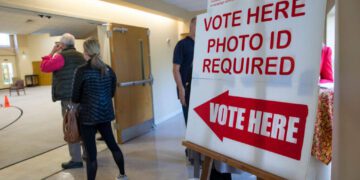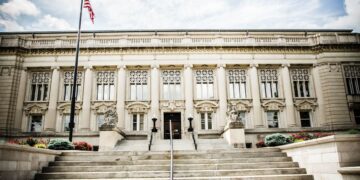By Hank Beckman -
After a thorough investigation, Brigham Young University officials came to the conclusion that there is “no evidence” that any BYU fan shouted racial slurs at female Duke volleyball player Rachel Richardson every time she served.
Duke has issued a statement defending Richardson, providing no response to the BYU statement, only stressing that the university will always stand by its students when their character is questioned.
Since the incident is relatively recent, there’s always the chance that more information will emerge confirming that the charge does have some basis in fact, so prudence dictates that a fair-minded person withhold comment until a sufficient amount of time has passed before concluding the charge was made maliciously and knowingly false.
And the BYU statement didn’t claim the slurs were never shouted, only that they found no evidence of it. So it’s possible that even though BYU interviewed at least 50 people in the vicinity where the slurs allegedly came from, examination of all available video turned up nothing, and the BYU basketball team—with several black players—was seated right next the area and heard nothing, it could have happened. Or she could have misheard something else shouted from the fan section; you may have noticed that sports fans can be loud and obnoxious.
So let’s not rush to judgement on the incident in the same manner that so many did when Jussie Smollett claimed that he fought off two MAGA hat-wearing bigots in sub-zero Chicago weather who poured bleach on him and tied a rope around his neck while advising him that the bluest section of Illinois was “MAGA country.” Amazingly, he was able to defend himself while at the same time talking on the phone with his manager and still holding on to his Subway sandwich; must have been a helluva sandwich.
In other words, let’s not be like the leftists in media who make up the vast majority of reporters and editors, and their readers and viewers who hang on their every word as if it was handed down from God himself, and simply believe anything that confirms our preconceived notions.
And yet…and yet, it cannot be denied that the entire scenario reeks of male cow excrement. We’ve seen this movie before and no one can be faulted for suspecting that the story of a BYU student shouting racial slurs at a black athlete is yet another in a long list of race hate hoaxes that pop up with a depressing regularity.
Because it’s not just the Jussie Smollett incident prompting suspicion.
There’s also Bubba Wallace claiming a garage rope pull was actually a noose placed on his garage door designed to intimidate him; and the Covington Catholic School kids being falsely accused of mocking an elderly Native American; and the case of the black men sitting in Starbucks without ordering anything, whose defenders screamed racism when the store manager asked them to leave unless he was buying something; and the case of Mike Brown, reported by many media as being killed by police with his hands up, only to be found to have been killed when charging the officer and trying to take his weapon away; and the case of Trayvon Martin, supposedly killed while innocently walking to a relative’s house, but actually shot in the process of attacking a man on neighborhood watch.
Hate crime hoaxes on college campuses are almost as much of the modern college experience as football games, cramming for finals, and keggers at the Teke house.
Oberlin College recently—and after several court decisions—reluctantly paid Gibson’s Bakery $36 million for defaming the owners as racist over a shoplifting incident in which the black Oberlin students admitted they were shoplifting. A black female Bowling Green student was found to have fabricated a story about how the day after Donald Trump’s election, she was harassed by white men throwing bricks at her. Another female student, this time Asian, at the University of Minnesota’s Twin Cities Campus reported a white male telling her to go back to Asia, after which a fight ensued, and the campus police showed up. But the investigation following the “incident” showed no police of any jurisdiction were contacted. A female Muslim student at the University of Louisiana at Lafayette who, following Trump’s election, was found to have fabricated a story about white bigots harassing her and ripping off her hijab. Donald Trump’s election seemed to have prompted an avalanche of hate crime hoaxes.
A deeper dive into the subject of hate crime hoaxes can be found in “Hate Crime Hoax: How the Left is Selling a Fake Race War.”
The 2019 book is the result of research by Wilfred Reilly, a Professor of Political Science at Kentucky State University, and the results are eye-opening.
Reilly’s initial research found that of 346 reported hate crimes, less than a third could possibly have been actual hate crimes. His later research unearthed 409 outright cases of hate crime hoaxes. (Some but not all were part of his original data set)
Reilly takes no position on what percentage of reported hate crimes turn out to be hoaxes, pointing out that to examine every interracial conflict in every jurisdiction in the United States, and the criminal records involved, would prove to be a insurmountable task.
Other researchers have taken on the phenomena in modern American history, including fakehatecrimes.org, a website serving as a data base of 469 hate crime hoaxes dating back to 1988. Laird Wilcox’s 1994 book “Crying Wolf: Hate Crime Hoaxes in America”, is an earlier work that Reilly cites in his own findings and lists in excess of 300 cases of hate crime hoaxes.
Whatever the number of reported hate crimes that turn out to be hoaxes actually is, a reasonable, well-informed person is not crazy or bigoted in assuming that the total is not insignificant.
It’s common for black leaders or white liberals to solemnly lecture us about being cowards on the race question, calling for us to have a national discussion on racial issues. Many warn that these discussions are necessary, even if they might be uncomfortable.
The leftists are actually right about the need for a national conversation on race. We could stand to have an honest discussion about racial bigotry in modern America.
But if hate crime hoaxes are part of the conversation, it might not be white people who wind up a little uncomfortable.







